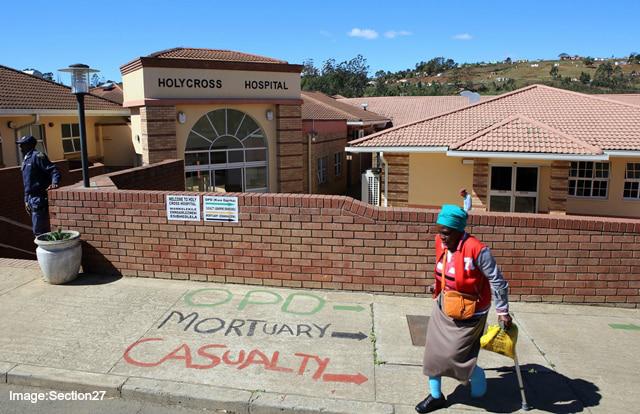Stigma and shame still shroud HIV

 This was the message delivered by Constitutional Court Judge Edwin Cameron when he delivered the Jonathan Mann Lecture at the International AIDS Conference today (Tuesday).
This was the message delivered by Constitutional Court Judge Edwin Cameron when he delivered the Jonathan Mann Lecture at the International AIDS Conference today (Tuesday).
Cameron reminded delegates that it had been 35 years since the Western world was alerted to AIDS, and since then, 35 million people had died of AIDS-related illnesses. In 2015 alone, 1.1 million people died.
Exhausting
“These last 35 years, have been long. For many of us, it has been an arduous and exhausting and often dismaying journey,” said Cameron, himself openly living with HIV. He referred to the AIDS denialism era in which South Africa saw a reported 300 000 people dying as a result of a tacit refusal by the Mbeki government to treat people living with HIV.
Following a protracted and sustained advocacy campaign and court action led by civil society, South Africa finally introduced antiretroviral treatment in 2004.
Cameron acknowledged that access to life-saving treatment had saved the lives of millions globally and that this had been hard won through focused activism. “We honour the part, in treatment availability and accessibility, of angry, principled and determined activists, in South Africa’s Treatment Action Campaign and elsewhere. For millions of poor people, their anger brought the gift of life,” he said.
Denied access
He cautioned the global community against declaring the fight to curb the epidemic won, and made particular reference to South Africa saying that too many people were still denied access to ARVs.
“In South Africa, despite our many successes, well over six million people are living with HIV and globally, of the 36.7 million people living with HIV at the end of 2015, fewer than half had access to ARVs,” he said.
“Most of those still in need of ARVs are poor, marginalised and stigmatised – stigmatised by poverty, sexual orientation, gender identity, by the work they do, by their drug-taking and by being in prison.”
Cameron paid tribute to Dr Jonathan Mann, saying that Mann worked in prisons and recognised that HIV stigma was driven by laws that criminalise transmission of HIV and exposure by another to it. Cameron labelled the laws “vicious” and “ill-considered and explained that by criminalising undefined “exposure”, these legislators ignored the science of AIDS which has demonstrated that HIV is easily transmitted.
Insufficient MSM care
Although the South African government has announced that from September 2016 it would roll out a programme which would see people all who test HIV positive receiving treatment regardless of CD4 count, Cameron believes that healthcare for men who have sex with men (MSMs) is insufficient.
“They lack programmes in awareness, education, outreach, condom provision and access to ARVs,” he said. He quoted a study by Professor Chris Beyrer which showed that the means to end HIV infections and AIDS deaths amongst men having sex with men is available but that “the world is still failing”.
“For this, there is one reason only – ignorance, prejudice, hatred and fear,” said Cameron. “The world has not yet accepted diversity in gender identity and sexual orientation as a natural and joyful fact of being human.”
Cameron made an impassioned plea for sex workers to be treated with dignity and respect. He called for police protection for sex workers rather than “exploitation and assault and humiliation”.
He invited activists from across Africa and the Caribbean to rise from their seats and join him on stage in solidarity against the stigmatisation of these key populations and called for renewed vigour in tackling the issues that were a barrier to equal treatment. – Health-e News.
An edited version of this story was also published on health24
Author
Republish this article
This work is licensed under a Creative Commons Attribution-NoDerivatives 4.0 International License.
Unless otherwise noted, you can republish our articles for free under a Creative Commons license. Here’s what you need to know:
You have to credit Health-e News. In the byline, we prefer “Author Name, Publication.” At the top of the text of your story, include a line that reads: “This story was originally published by Health-e News.” You must link the word “Health-e News” to the original URL of the story.
You must include all of the links from our story, including our newsletter sign up link.
If you use canonical metadata, please use the Health-e News URL. For more information about canonical metadata, click here.
You can’t edit our material, except to reflect relative changes in time, location and editorial style. (For example, “yesterday” can be changed to “last week”)
You have no rights to sell, license, syndicate, or otherwise represent yourself as the authorized owner of our material to any third parties. This means that you cannot actively publish or submit our work for syndication to third party platforms or apps like Apple News or Google News. Health-e News understands that publishers cannot fully control when certain third parties automatically summarise or crawl content from publishers’ own sites.
You can’t republish our material wholesale, or automatically; you need to select stories to be republished individually.
If you share republished stories on social media, we’d appreciate being tagged in your posts. You can find us on Twitter @HealthENews, Instagram @healthenews, and Facebook Health-e News Service.
You can grab HTML code for our stories easily. Click on the Creative Commons logo on our stories. You’ll find it with the other share buttons.
If you have any other questions, contact info@health-e.org.za.
Stigma and shame still shroud HIV
by Ntsiki Mpulo, Health-e News
July 20, 2016
MOST READ
Social media for sex education: South African teens explain how it would help them
Prolonged power outage leaves hospitals in the dark for two days
There’s more to self-care than scented candles or massages, it’s a key public health tool
Access to clean water and stable electricity could go a long way to addressing rising food poisoning in SA
EDITOR'S PICKS
Related


